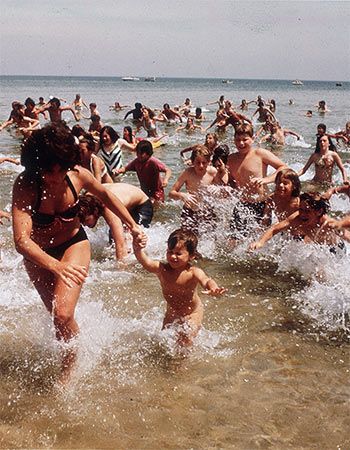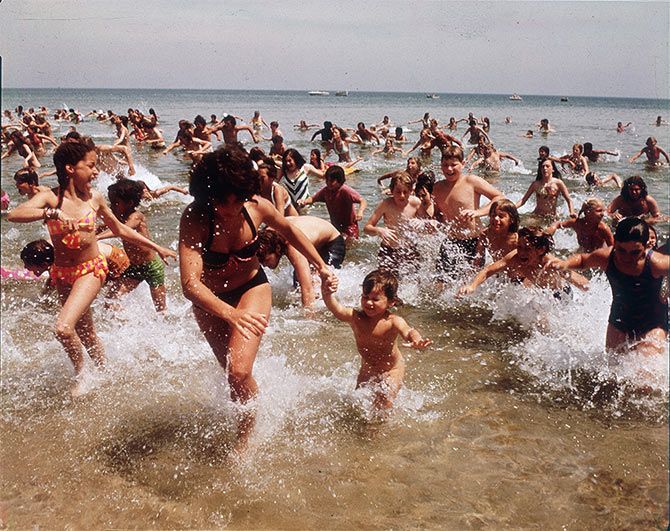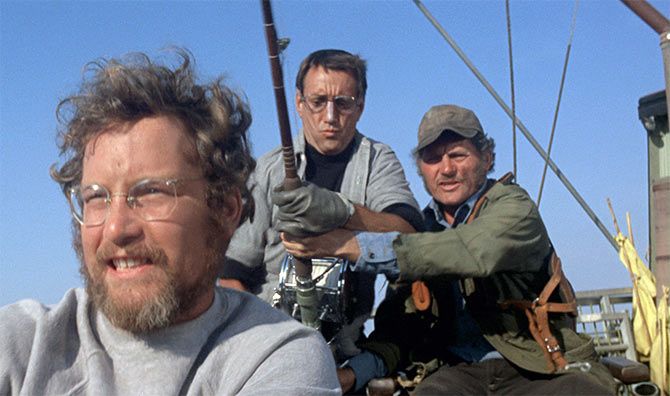
When Jaws released in June 1975, it changed the way Americans watch movies, says Aseem Chhabra.
It was the summer of 1975 and Americans were out celebrating their greatest outdoor passion -- going to beaches along the East and West coasts, tanning their bodies, worshipping the sun, reading bestsellers and cooling off by swimming in the sea.

The year before millions of Americans had already read Peter Benchley's bestseller Jaws, the hunt for a giant man-eating white shark and the various subplots, including extramarital affairs, in a fictional New England town.
But the film version of Jaws that hit the theatres in June 1975 was a momentous occasion. It changed the way Americans watch films and how Hollywood markets its potential summer blockbusters.
Jaws was the first film in the history of Hollywood to cross the $100 million mark. That is a very significant number, given that in 1975, the average movie ticket price in the US was only $2.03 (according to the National Association of Theatre Owners).
Jaws eventually grossed $470 million worldwide. Its position as the number one Hollywood film would be challenged two years later with the release of George Lucas's Star Wars.
More importantly, Jaws launched the career of Steven Spielberg, who tops the list of Hollywood royalty today.
Spielberg was 28 and one film old -- Sugarland Express released in 1974 -- and he had made a few shorts and one remarkable television film Duel (1971), when he was approached by producers Richard D Zanuck and David Brown to direct Jaws.
Zanuck and Brown had also produced Sugarland Express, but Spielberg was not their first choice to direct Jaws. They first approached John Sturges (director of films like The Magnificent Seven and The Great Escape) and Dick Richards (Heat), before the young Spielberg decided to take on the challenge of a film that was supposed to cost $3.5 million.
But between the many screenplay versions, starting with a few drafts that Benchley first wrote, and then polishing and rewrites by many well-known Hollywood writers like Howard Sackler, Carl Gottlieb, John Milius, Matthew Robbins and Hal Barwood, Jaws was shot in nearly 160 days (the original shoot was supposed to be 55 days long).
Eventually, Jaws's production cost was more that double of its original budget. The delays in the shoot was caused by many reasons, including as Spielberg has said in interviews, because of his inexperience as a filmmaker. The 25-foot mechanical shark built for the film (nicknamed Bruce after Spielberg's lawyer) had all sorts of technical problems.
But the rewrite of the script had one positive affect. The film that Spielberg shot was a tight thriller, essentially the story of three men -- a police chief (Roy Scheider), an ichthyologist (Richard Dreyfuss) and a ship captain (Robert Shaw) chasing the killer shark.

Jaws was an epic man versus nature adventure drama that drove the audience away from the beaches and into the movie theatres.
The mechanical problems with the shark resulted in Spielberg showing less of the giant contraption (even with that, many critics observed that the shark looked very artificial). Instead, he depended more on creating the fear of the unseen.
In the film, Spielberg often portrayed the horror by showing hapless swimmers from the point of view of the shark. The audience could sense the enemy, but often they could not see it.
Spielberg layered the emotional sensation of the fear with John Williams's classic Oscar winning score 'da-duh, da-duh.' Even today, that menacing music haunts the psyche of Jaws fans.
As a teenager, I was disappointed that Spielberg's PG-rated film lacked the sex sequences of Benchley's book. Now, years later, I realise that Jaws is a much more focused film, and Hitchcockian in its mood and ethos.
In his review of the film, Newsday critic Joseph Gelmis wrote: 'Director Steven Spielberg has immeasurably improved the bestselling Peter Benchley potboiler novel.'
Even Spielberg acknowledged the influence of Alfred Hitchcock's style of suspense. 'The film went from a Japanese Saturday matinee horror flick to more of a Hitchcock, the less-you-see-the-more-you-get thriller,' he said in an interview.
Universal released Jaws on over 460 screens, which was a substantial number for 1975.
In today's time, big movie open in far more theatres, sometimes as high as 3,000 plus screens. The film was backed by a huge marketing and advertising drive that cost over $1.8 million, another first for a Hollywood film. The film's trailer played for two weeks on prime time television before the release date and that advertising cost $700,000.
In 1975, Americans usually did not go for advanced booking for films. That has changed in the age of Internet and online booking. But when Jaws opened in 1975, there were long lines outside theatres across the country.
This was to be the first of several such momentous film occasions in the US and Steven Spielberg matched the success of Jaws with other summer blockbusters -- Raiders Of The Lost Arc, Indiana Jones And The Temple of Doom, ET, Goonies and Jurassic Park. In fact, many refer to Spielberg as the filmmaker who defined the concept of what we now consider as summer blockbusters.
Most critics loved Jaws.
Pauline Kael of New Yorker wrote: 'It may be the most cheerfully perverse scare movie ever made.'
Judith Christ of New York magazine said: 'The result is a fast-paced, straight-line thriller that moves without pause toward the climactic contest...'
Kathleen Carroll of New York Daily News said: 'Spielberg had paced the film beautifully so that one is always on edge, tensed for those scary moments that turn out to be false alarms, and left somehow totally unprepared for the real shocks.'
Eventually, none of that mattered.
Even though Jaws was a well-crafted film, the heavy advertising, the fact that Benchley's novel was already a bestseller, and positive word-of-mouth buzz, made the film review-proof.
As a critic, I often observe that reviews published in influential publications have no impact on how the audience reacts to a film, especially when it comes to a lavish big budget production with stars.
Jaws may have started that trend of review and critic-proof films.






 © 2025
© 2025